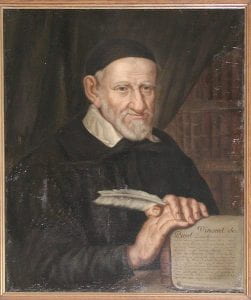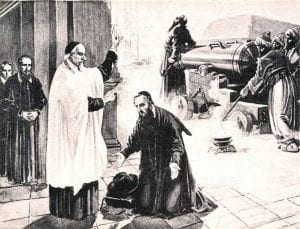
Reflection by: Mark Laboe, Interim Vice President, Mission and Ministry
A very influential and helpful idea on my personal spiritual journey emerged for me decades ago when I read This Blessed Mess: Finding Hope Amidst Life’s Chaos by Patricia Livingston. The simple yet profound main idea that captured my attention and that I internalized was this: just as God created life, love, and beauty out of darkness and chaos (see Genesis), so must we be agents of the ongoing creative process in our own lives, during which we often face moments of chaos. Furthermore, there is a creative energy that is present within the chaos of our lives that can ultimately become transformative and life-giving. Grasping this idea conceptually is one thing, but living it is another.
Fortunately, life inevitably provides a lot of practice by bringing us situations that feel like chaos again and again over the course of a lifetime. This might take the form of heartbreaking and tragic losses, illness and injury, or seemingly impossible situations in which the whole world seems to be against us. We may also have to deal with the painful aftermath of harmful human decisions and actions, whether our own or those of others (such as war and violence, greed, or ego-driven and self-centered behaviors). Whatever form it takes, the word “mess” is an unfortunately adequate description for what we often face in our lives. How could this “mess” possibly be “blessed”?
One piece of adult wisdom that helps us get through such moments comes in remembering simply that “this too shall pass.” I have heard it suggested that the difference between the child and the adult is that that adult knows the moment will pass. A child or adolescent is without the life experience to know that a painful life situation will eventually give way. Christian theology holds the profound understanding of the paschal mystery, modeled in the life, death, and resurrection of Jesus, to understand that there is hope and the potential for new life and redemption on the other side of death and suffering.
In fact, each “blessed mess” offers us an opportunity to clarify and define who we are and who we will become moving forward from that difficult moment. It is an opportunity to create and re-create our lives, grounded in the values and actions we know or believe to be good, true, and beautiful, and for the betterment of humanity. Victor Frankl, the famous Holocaust survivor, is known to have said that “everything can be taken from a (person) but one thing: the last of the human freedoms—to choose one’s attitude in any given set of circumstances, to choose one’s own way.” [1] Though I may first complain and cry in the face of chaos, sometimes I can also then laugh out loud when things start piling up on me and I realize that I am more… and life is more… than what I am experiencing in that moment. I am encouraged when I consider the freedom that I have to choose how I will face it.
Moments of “chaos” lead me repeatedly to the question: What anchors and guides me now and ultimately? What values and commitments do I want my life to reflect, and do I want to choose to live into in this moment? Which are most consistent with who I know myself to be and believe I was created by God to become? And how can we answer these questions in applying them to ourselves as a community?
Institutions and communities go through similar moments. Yet, making a shared commitment or “attitude adjustment” as a collective is quite a bit more complicated than just deciding to do so for oneself. It can be work, and it can require patience, empathy, generosity, love, and courage to get all on the same wavelength. Yet, having a shared mission to draw on can help a community like ours at DePaul. As we move through difficult and uncertain moments, our periods of chaos can become opportunities for clarification, for remembering and re-committing to each other, and for carefully discerning the values and sense of vocation that anchor and guide us.
I have often heard two related African proverbs quoted that emphasize the communal nature of the human person. They serve as important reminders about how we may best move through communal moments of chaos. One states that “no one goes to heaven alone,” and another is, “If you want to go fast, go alone, and if you want to go far, go together.” In a society and world that is so often individualistic or that struggles to bridge divides, such a communal mindset is countercultural. However, at DePaul, we often point to an understanding that we are a “community gathered together for the sake of the mission.” This is a modern take on the initials C.M. for Congregation of the Mission, the apostolic community we may better know as the Vincentians, established by Vincent de Paul. Our mission, therefore, offers us the encouragement and the charge to be countercultural in working and caring for the good of the whole, rather than simply defending our own individual positions or being satisfied simply with “going it alone.”
To move through moments of chaos in our lives, then, we benefit from seeing them as opportunities to anchor ourselves more deeply in what is most important and most true to who we are, and to do so together with others. The moment will pass, and we will endure. The question that remains throughout it all is who we will become in the process. Such moments reveal the ultimate gift and test of our human freedom, our identity, and our mission.
Reflection by: Mark Laboe, Interim Vice President, Mission and Ministry
[1 ]Dave Roos, “Viktor Frankl’s ‘Search for Meaning’ in 5 Enduring Quotes,” June 7, 2024, howstuffworks.com, at: https://history.howstuffworks.com/historical-figures/viktor-frankl.htm.






